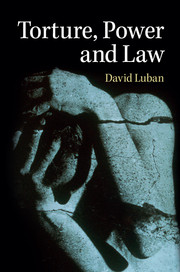Book contents
- Frontmatter
- Dedication
- Contents
- Preface
- Acknowledgments
- I Downgrading rights and expanding power during post-9/11 panic
- II The ticking bomb as moral fantasy and moral fraud
- III The evils of torture
- IV Complicity in torture
- 8 The torture lawyers of Washington
- 9 Tales of terror: lessons for lawyers from the “war on terrorism”
- 10 An affair to remember
- Main index
- Index of legal authorities
- References
8 - The torture lawyers of Washington
Published online by Cambridge University Press: 05 September 2014
- Frontmatter
- Dedication
- Contents
- Preface
- Acknowledgments
- I Downgrading rights and expanding power during post-9/11 panic
- II The ticking bomb as moral fantasy and moral fraud
- III The evils of torture
- IV Complicity in torture
- 8 The torture lawyers of Washington
- 9 Tales of terror: lessons for lawyers from the “war on terrorism”
- 10 An affair to remember
- Main index
- Index of legal authorities
- References
Summary
Preface
I wrote this chapter for my book Legal Ethics and Human Dignity, a book about the ethics of the legal profession. It provided an extended case study of one of the main themes of that book, the central role that lawyers providing legal advice to clients play in maintaining the rule of law – or, in this case, subverting the rule of law. The chapter had a second purpose as well, pulling together in a single place a substantive history and critique of all the main torture memos available at the time. Its critique of the Bybee and Levin memos overlaps with, but also extends, the arguments detailed in Chapter 3 of this volume, which I also presented in longer form in Karen J. Greenberg’s The Torture Debate in America.
At the time I wrote this chapter, however, not all the torture memos were known. The Bybee memo referred to another secret memo applying its arguments to specific CIA interrogation techniques, which was not made public. In addition, though, the Office of Legal Counsel’s head Steven G. Bradbury wrote three more torture memos in 2005, and these were unknown when I wrote this chapter. One of these memos revisited the secret Bybee–Yoo “techniques” memo, and once again declared that none of the CIA’s “enhanced” interrogation techniques amount to torture. The second found that the same would be true even if the techniques were used in combination. And the third found that the techniques, singly or in combination, would not constitute cruel, inhuman, or degrading treatment other than torture. These three memoranda – revoked by the Obama administration and then released to the public in 2009 – reach conclusions just as radical as the Bybee–Yoo memoranda, but drew far less criticism. In part that is because the Bradbury memoranda did not include discussions of the commander-in-chief power or of criminal defenses, which were among the most inflammatory portions of the Bybee–Yoo memoranda. But also, the Bradbury memoranda were less obviously tendentious in their handling of legal materials.
- Type
- Chapter
- Information
- Torture, Power, and Law , pp. 197 - 253Publisher: Cambridge University PressPrint publication year: 2014
References
- 2
- Cited by



